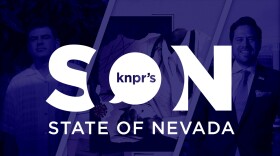If you or someone you know has attention deficit hyperactivity disorder, or ADHD, chances are they take the drug Adderall to treat it. The problem is, that drug is getting harder and harder to find.
Millions of kids and teenagers —6 million have been diagnosed with ADHD since 2016—take Adderall. The number grew significantly during the pandemic, and more and more adults take the drug.
We’re talking today with those who counsel and prescribe ADHD medication: what it does, how it works and the problem this shortage may cause to those who take it.
Dr. Kevin Reyes is a Las Vegas-based psychiatrist. He said many of his ADHD patients come in from elementary school, including parents concerned about their child’s academic performance.
“One of the characteristics of diagnosing ADHD is you need to have deficits both in it or in multiple environments, not just one,” he said, so they see if the symptoms are consistent.
Since COVID-19, there’s been an increase in cases of ADHD. He said it’s thought that stems from parents being at home with their children and becoming able to see the symptoms. There has also been a rise in young adults being diagnosed.
Since last year, Adderall has been in short supply around this country. The company that produces the drug has said their production has been slowed for staffing and other reasons. Some also blamed the Drug Enforcement Administration agency and manufacturing quotas that aren't very flexible.
Reyes said there’s a limitation on a certain ingredient that’s able to be distributed. There’s also a limit on how much pharmacies are allowed to dispense. He said he’s had some patients wait up to two weeks to get their medication. He said one solution is calling around to pharmacies until you find one where the drug is available.
“The other is, of course, speaking with your psychiatrist, or a physician. Maybe there are other alternatives to the medication that you're taking, or something that is like the original prescription that you were prescribed,” he said.
Tabitha Johnson, a clinical alcohol and drug abuse counselor, said she’s had many patients mention the shortage recently.
“I work with a lot of teens, many who have ADHD … they're definitely telling me that they're struggling on the job or in the classroom. And so we're working in therapy on different coping skills in the interim, while they're working with their prescriber,” Johnson said.
Some have attributed the rise to TikTok, where hashtags related to ADHD have been used billions of times. Johnson called that a double-edged sword:
“On the one hand, as a mental health professional, it's amazing to see that we have so much more access to information these days, however, we just need to be mindful of who's giving that information. So I always tell people, ‘Hey, if you think that you have certain symptoms, meet with a licensed or credentialed professional, so whether that's a psychiatrist to determine if you have ADHD,’ or you're meeting with a psychologist to do specific testing, please seek out the actual professionals. But again, it's great that information is out there, we just need to use it wisely.”
It’s also just more widely talked about, Reyes said:
“As mental health is becoming less stigmatized, we are a little bit more able to discuss our symptoms and our challenges in a more welcoming environment. And I think that ADHD is a psychiatric or mental health diagnosis. So like all these other ones, we are becoming more comfortable discussing this or talking about it.”
Guests: Tabitha Johnson, licensed clinical alcohol and drug abuse counselor, Marathan Counseling and First Med Health and Wellness Center; Dr. Kevin Reyes, psychiatrist, with Reyes Psychiatry










